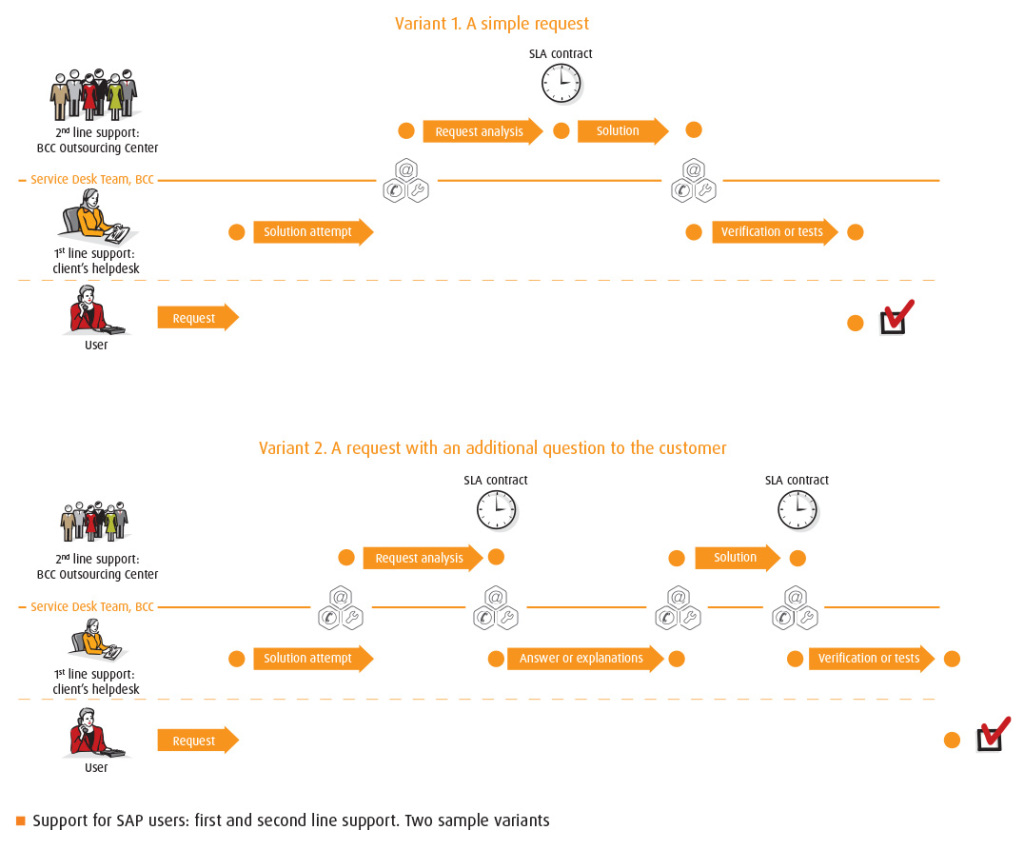There’s nothing more irritating in daily work than minor (or sometimes major) problems and failures of the basic tool that can make a simple task take two hours – instead of 10 minutes – to complete and ruin the whole plan of the day. And this is an “optimistic" version. A much more serious consequence of the SAP system failure or maladjustment to the new realities may be the inability to perform basic business transactions (e.g. sales, receipt in the warehouse, posting, payroll calculation).
Something that is a big inconvenience for users can generate company-wide significant costs of the ongoing system administration, debugging and remedying failures, and often requires ad hoc services of an external consulting company that has necessary competencies. The loss that cannot be made up for is also the time spent on troubleshooting and arranging for such emergency support.
The most common ills and difficulties obstructing the smooth and reliable operation of the system are connected with emerging errors that prevent the execution of basic activities, with providing appropriate competencies, and changes in the business and legal environment, as well as staff turnover (leavings of experienced users).
It has stopped working!
I can’t print an invoice, it’s impossible to post the documents, I can’t log in to the system, an easy transaction has been processed for as long as several minutes now, the results of the monthly report are incorrect at the first glance…
Such complaints and similar ones are virtually inevitable in an organization that uses the SAP system intensively every day. Whether caused by an application error or configuration error, the lack of an update, or a human error – the inability to perform essential tasks in the system is the basic and most common problem of users.
How to do it, i.e. competencies
Even if users have the expert-level knowledge about their area of SAP, they may be unable to make changes in the configuration of settings or may need simple tips on how to perform an incidental activity, e.g. how to carry out the process of hiring an employee on a non-standard working time basis, how to calculate a paternity leave for the first time (HR), how to account for the asset according to a specific method of depreciation (FI) – these examples illustrate that a special training is not always necessary and just a simple briefing is sufficient.
The human memory is fallible. It is good to have a specialist at hand who will remind you how to perform a specific action in the system or where the option you are looking for is located. It does not pay to learn how to carry out actions that are performed rarely or once. It may be more cost-effective – and faster – to outsource their execution.
The knowledge transfer and increasing the level of competence is especially important in the case of new employees when they have to be made familiar with corporate business processes and tools to be used within the shortest possible time.

Michał Adamczewski, Support Service Deputy Director, All for One Poland
A changing business environment
Shortly after the implementation, the SAP system reflects the company’s status quo. But the business is alive, and the system should live and change with it: the company is introducing a new product into the market, launching a collaboration with a new bank, a key customer has just changed his requirements regarding the appearance of warehouse labels or invoices, we are opening a new warehouse … Minor and major changes in the business must be properly implemented in the system. Some of these changes can be made by key users, but some need the interference with the configuration settings or even minor development work, which goes beyond their competence and moreover, is time consuming.
Legislation changes
Following the law changes, which are frequent in our country, the manufacturer of the system, SAP, publishes periodic update packages that take these changes into account. However, in a complex IT solution, often also extended with new functions, it is not sufficient to just click on the “Update" button and wait for the system to be restarted. Updates must be made with taking into account the specific features of the corporate solution configuration and need to be tested and adjusted. Some legal changes interfere to such an extent with the implemented business processes that it is necessary to introduce configuration changes, which sometimes make up a small project (e.g. an amendment of the VAT Act in 2010 and 2014).
Staff shortages
Experienced users of the SAP system in individual modules are highly valued in the labor market. Especially in recent years, as our country has become a “hub" of shared services centers of large corporations and companies providing other SAP services, companies face problems with the staff turnover, related especially to the leaving of employees who know how to handle business processes in the SAP system.
Leavings, long-term absences, a big number of new, inexperienced employees and finally an “ordinary" holiday season are the events that sooner or later occur in each department or team in a company. In no organization the staff turnover should adversely affect the efficiency of the SAP system use, smooth performance of daily activities or the pace of business development.
Customer benefits of SAP user support at BCC (now All for One Poland)
– Unlimited access to expertise
– Flexibility in adapting the support to changing needs and requirements (additional people, additional areas, peaks, minor development work)
– Flexible adjustments of cooperation to the needs through contractual provisions (SLAs)
– Focus on the customer’s own business – continuous availability of the system
– No problems with maintaining an internal support organization (staffing and organizational problems)
– No technical or organizational constraints as to the scope or volume of support
– A fixed subscription fee
Problems and how to deal with them
The 20-year experience of BCC in the implementation, development and maintenance of SAP systems for customers shows that these problems will sooner or later come up in every organization. The question of when, how often and in what configuration depends on many factors: the stability of the system and the condition of the IT infrastructure, a personnel policy, a strategy of the implementation of business changes, and sometimes just … bad luck.
The essential question is not whether the system will pose additional challenges, but how our organization is prepared for them; how it will prevent the decrease in performance and availability of the SAP system for the business support purposes.
Support within the organization…
A natural trend in the system maintenance is to build support within the organization, usually based on an internal IT team. This solution, which is often suitable for first-line support, no longer works so well in the case of more complex requests that require a cross-module knowledge or narrow, specific competencies, and that are made with unpredictable intensity.
The most important challenges facing internal SAP support teams are:
- providing and maintaining competencies that will guarantee support for all business areas covered by the system. This concept should also include the development of the competence maintenance and improvement plan in the long term;
- ensuring the continuity of support availability, that is the guarantee that every problem will be solved within the time acceptable for business, rather than depending on when a specialist is available;
- providing a potential (related to the preceding section); this means the organization of a team work in such a way so as to provide a sufficient number of specialists in specific fields and their constant availability (the specialists should be able to provide support whenever it is needed, also with taking into account e.g. a shift work system in the production department), bearing in mind the cost-effectiveness;
- workload planning, that is the planning of work for team members in such a way so as to ensure the system security during periods of increased intensity of work (month-end closing, payroll calculation), and at the same time to efficiently use the resources when there are less current tasks;
- a contingency plan – for emergency situations, such as unforeseen staff shortages, the need for periodic assignment of employees to other tasks (business or IT projects).

…or outsourced
Do these challenges really have to keep managers awake at night? Maybe instead of spending time and energy on addressing them, it would be better to fully use the system capabilities by outsourcing the user support service to a professional support organization.
Also an external company providing SAP application management services is faced with similar challenges. However, it does have a significant advantage over a company focused on its core business. Consulting services are its main operations, and provision, maintenance and development of competencies make up the foundation of its business and the highest priority.
A large support organization with an extensive portfolio of customers focuses its whole performance potential on providing customers with the continuity of support that comprises receiving and handling of requests in accordance with the conditions agreed with customers (including on-call support duties in extended business hours). The continuity and quality of customer support is guaranteed by a dedicated support organization, acting according to recognized industry standards and undergoing periodic certifying audits.
The provision of services for many customers enables the potential to be effectively used and the workload to be evenly planned throughout the year. In addition, consultants are constantly developing their experience, working for customers running various types of business, getting to know new features, new capabilities of systems, becoming familiar with new releases (e.g. novelties in EHP upgrade packages).
The contingency plan is the potential of a support organization, which employs even as many as several hundred consultants with a broad spectrum of competence.
By outsourcing the services, the customer can dispose of the problems connected with maintaining support teams and be sure that the application support is provided in line with the agreed parameters (a Service Level Agreement). The selection of the right service provider who is able to ensure the compliance of support with individual needs of the customer is a key decision.
If you decide for outsourcing, select BCC
The SAP application management, i.e. remote support of users at BCC (now All for One Poland), is provided at the BCC Outsourcing Center. The BCC Outsourcing Center is a dedicated support organization, ensuring the quality and continuous handling of all maintenance and outsourcing contracts of BCC customers. The Center operates in accordance with the standards and best practices applicable to support organizations. The most important of them are:
- IT Service Management System compliant with ISO 20000,
- Information Security Management System compliant with ISO 27001.
The SAP application management at BCC (now All for One Poland) is distinguished by its individual approach to partners. Models of cooperation (a scope of support activities, availability time, guaranteed response times, an accounting model) are tailored to the customer’s expectations and reflect his needs. In fact, for every customer, the SAP application management is a dedicated package of tailor-made services, reflecting various needs regarding the support of his operations.
All customers share the need to fill the gaps in their organizations and expect the service provider’s flexibility in adjusting the scope of cooperation to changing realities.
External support means a direct and unlimited access to specialist expertise in each area of the SAP system and complementing an internal potential for ongoing maintenance of the system. And for companies that have created their own support structures, the service of BCC may constitute the “last resort" – the third line support for resolving complex issues and doing work in the system.

All services included in a package
The communication with BCC (now All for One Poland) customers and handling of service requests is coordinated by the ServiceDesk Team, which is responsible, for example, for forwarding customer requests to the appropriate teams of specialists. In this way, the single point of contact (SPOC) rule is implemented. Customer requests are recorded, processed and reported in the dedicated service application. As a result, the customers of BCC can be confident that regardless of the reported problem, the time and manner of reporting it, it is dealt with by the appropriate specialists and that its solution will be delivered according to the contract and SLA provisions (including the provisions regarding response times).
Another dimension of communication is the appointment of a dedicated coordinator for each customer and the ability to evaluate requests immediately after their closure (continuous evaluation of the quality of services).
For customers, an added value of using the SAP application management at BCC is an easy access to the full range of SAP/IT outsourcing services (hosting, collocation, SAP/IT administration, SAP maintenance, monitoring of systems and networks, a backup data center, etc.). A single partner “for everything", providing a full set of services means a clear assignment of responsibility for the system maintenance, an access to a broad spectrum of competence, easier handling of SLA contracts and consolidation of the costs of services.
The provision of services to customers as part of the application support is a responsibility of over 30 consultants in five dedicated teams corresponding to the major areas of the SAP system: finance and controlling, human resources, sales, distribution and CRM, materials management and warehouse management as well as production planning and quality management. The work of support consultants – in contrast to implementation consultants – is focused on the remote support for customers, solving current problems and handling service requests. Many years of project and support experience, as well as a good knowledge of customers’ systems make them top-class experts.
The strength of the BCC (now All for One Poland) application management is the underlying potential of BCC, an SAP market leader in Poland and a key provider of IT outsourcing services.


